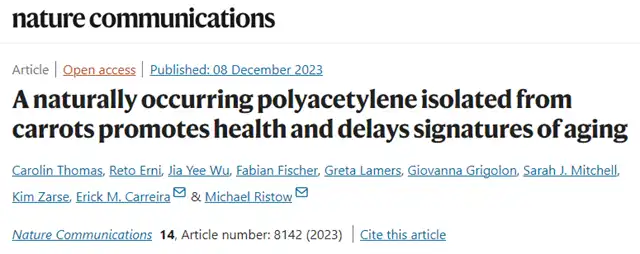Carrots reduce the risk of cancer by 20% and extends lifespan
- Normal Liver Cells Found to Promote Cancer Metastasis to the Liver
- Nearly 80% Complete Remission: Breakthrough in ADC Anti-Tumor Treatment
- Vaccination Against Common Diseases May Prevent Dementia!
- New Alzheimer’s Disease (AD) Diagnosis and Staging Criteria
- Breakthrough in Alzheimer’s Disease: New Nasal Spray Halts Cognitive Decline by Targeting Toxic Protein
- Can the Tap Water at the Paris Olympics be Drunk Directly?
Carrots reduce the risk of cancer by 20% and extends lifespan
- Should China be held legally responsible for the US’s $18 trillion COVID losses?
- CT Radiation Exposure Linked to Blood Cancer in Children and Adolescents
- FDA has mandated a top-level black box warning for all marketed CAR-T therapies
- Can people with high blood pressure eat peanuts?
- What is the difference between dopamine and dobutamine?
- How long can the patient live after heart stent surgery?
Carrots reduce the risk of cancer by 20% and extends lifespan
Cancer remains a major global public health concern. In recent years, factors such as diet, environment, and an aging population have led to a continuous increase in cancer incidence globally, with cancer emerging as a prominent cause of death.
Carrots, rich in α-carotene, vitamin C, potassium, fiber, and other nutrients, play a crucial role in promoting overall health and normal bodily functions. Carrots serve as a primary dietary source of various potential anti-cancer compounds.
Recently, researchers from Newcastle University in the United Kingdom published a study titled “Carrot intake is consistently negatively associated with cancer incidence: A systematic review and meta-analysis of prospective observational studies” in the journal “Critical Reviews in Food Science and Nutrition.”
The study revealed a significant correlation between increased carrot consumption and reduced cancer incidence. Compared to those who don’t consume carrots, individuals who consume 400 grams of carrots per week can reduce their cancer risk by 20%, while even consuming just 60 grams per week can lower the risk by 4%.

In this study, researchers conducted a meta-analysis of 198 eligible studies, involving 138,917 cancer cases and 4,707,643 participants. Carrot intake was assessed through food frequency questionnaires, and the relationship between carrot intake, α-carotene plasma concentration, and cancer incidence was analyzed.
The analysis of carrot and α-carotene intake revealed a 10% reduction in cancer incidence among those consuming the highest amounts compared to the lowest.
Furthermore, carrot intake showed a consistent negative correlation with cancer incidence across different regions and types of cancer.
Analysis of plasma α-carotene levels demonstrated a consistent and stronger anti-cancer effect. Individuals with the highest plasma α-carotene levels had a 20% lower cancer incidence compared to those with the lowest levels.
Dose-response analysis of carrot intake and α-carotene plasma concentration showed a significant linear relationship with reduced cancer risk.
Specifically, consuming 400 grams of carrots per week reduced cancer risk by 20% compared to not consuming carrots, and increasing plasma α-carotene levels by 50 μg/L decreased overall cancer incidence by 9%.
Researchers noted a relatively consistent effect among different cancer types, suggesting mechanisms beyond specific organs, such as inflammation regulation. The strong linear relationship between carrot intake and reduced cancer risk suggests that consuming a carrot a day may help lower cancer risk.
It’s worth mentioning that on December 8, 2023, researchers from the Swiss Federal Institute published a study titled “A naturally occurring polyacetylene isolated from carrots promotes health and delays signatures of aging” in the journal “Nature Communications.”
The study demonstrated that a natural polyacetylene compound found in carrots could extend the lifespan of nematodes. Additionally, supplementing this compound in mice improved glucose metabolism, increased endurance, and reduced indicators of frailty associated with aging.
This suggests that the natural compound in carrots may delay and improve age-related diseases in humans.

In conclusion, the research indicates a negative correlation between carrot consumption and cancer incidence, along with potential lifespan extension. Consuming 400 grams of carrots per week can reduce cancer risk by 20%. The findings support increasing carrot intake to lower the risk of cancer and other diet-related diseases.
Paper Links:
https://doi.org/10.1080/10408398.2023.2287176
https://doi.org/10.1038/s41467-023-43672-7
Carrots reduce the risk of cancer by 20% and extends lifespan
(source:internet, reference only)
Disclaimer of medicaltrend.org
Important Note: The information provided is for informational purposes only and should not be considered as medical advice.



